Croatia, with its stunning Adriatic coastline, rich history, and vibrant culture, is a land of diverse flavours and gastronomic wonders waiting to be discovered. A culinary journey that will take you to the heart of the Mediterranean.
Nestled along the azure waters of the Adriatic Sea, Croatia boasts a culinary heritage deeply intertwined with its geographical diversity and centuries of cultural influences.
Welcome To Your Vegan Travel Guide Croatia
In this blog, we’ll delve into the world of vegan food in Croatia, a hidden gem for plant-based travellers and food enthusiasts. Join us as we embark on a delectable adventure, uncovering the best vegan restaurants, traditional dishes with a vegan twist, and the local ingredients that make Croatian vegan cuisine an unforgettable experience.
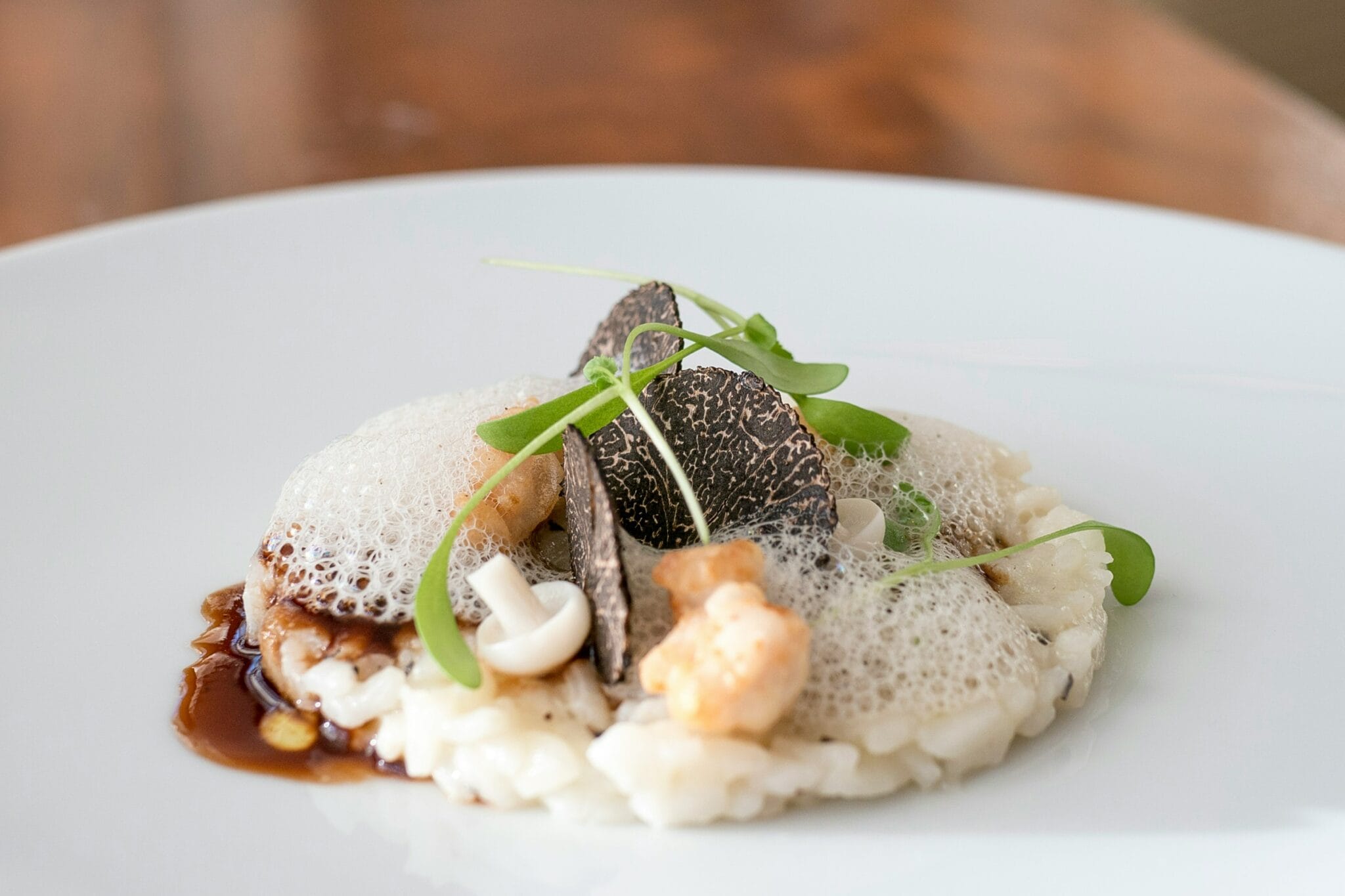
Nestled along the crystalline waters of the Adriatic Sea, Croatia unveils its culinary secrets with a tapestry of flavours steeped in history and influenced by its diverse geography. Croatian cuisine reflect the country’s deep connection to its land, sea, and cultural heritage. Traditionally known for its hearty meat dishes, seafood specialities, and dairy-rich recipes, Croatian cuisine may initially seem challenging for vegans. We invite you to savour the beauty of Croatia, one vegan bite at a time.
A Brief History Of Croatian Cuisine
The history of Croatian food is a fascinating journey through centuries of cultural influences, trade, and regional diversity. Various factors, including geography, climate, historical events, and neighbouring countries, have shaped Croatian cuisine.
Here, there is a strong emphasis on fresh, seasonal, and locally sourced ingredients. Furthermore, traditional cooking methods, such as roasting over an open flame or baking in wood-fired ovens, are still cherished in many parts of Croatia, preserving the authenticity of their dishes.
Ancient Roots
Croatian cuisine has deep roots in the culinary traditions of the Illyrians, the region’s ancient inhabitants. These early cultures relied on locally available ingredients, such as grains, legumes, and vegetables.
Roman Influence
Croatia was part of the Roman Empire, and Roman culinary customs left a lasting impact. The Romans introduced ingredients like olives, wine, and fish, which remain staples in Croatian cuisine today.
Slavic Migration
With the arrival of Slavic tribes in the 6th and 7th centuries, new culinary practices and ingredients were introduced. Staples like cabbage, potatoes, and dairy products became more common.
Medieval Croatia
During the Middle Ages, the cuisine of the region evolved further. Trade with Mediterranean cultures led to incorporating spices, herbs, and fruits into Croatian dishes. The use of honey as a sweetener also became prevalent.
Ottoman Influence
In the 15th and 16th centuries, parts of Croatia were under Ottoman rule. This period introduced elements like coffee, spices, and kebabs to Croatian cuisine, especially in the eastern regions.
Habsburg Rule
Croatia came under Habsburg rule in the 18th century, and this period brought Austrian and Hungarian influences. Dishes like schnitzel and goulash were adopted and adapted into Croatian cooking.
Yugoslav Era
During the 20th century, Croatia was part of the former Yugoslavia. This era saw the fusion of various regional culinary traditions, resulting in a diverse and varied cuisine.
Modern Croatian Cuisine
Today, Croatian cuisine is characterised by its regional diversity. Coastal regions rely heavily on seafood, olive oil, and Mediterranean flavours, while inland areas favour heartier dishes with meats, dairy, and freshwater fish. Traditional cooking methods, such as grilling and slow-roasting, remain popular. Many plant-based side dishes and salads are shared with freshly baked bread at the table.
Fasting (Roman Catholic Holidays)
Over 85% of the population in Croatia identifies as Roman Catholic, and several religious holidays are observed during the calendar year. Certain holidays are centred around periods of fasting, where vegetarian meals are typically consumed, and meat is avoided. For this reason, many are familiar with the vegetarian diet and are open-minded to those observing a plant-based lifestyle.
Here are some of the holidays that require fasting:
- Lent (Korizma): Lent is the 40 days of fasting and reflection leading up to Easter. During Lent, many Catholics abstain from meat on Fridays and sometimes Wednesdays.
- Good Friday (Veliki Petak): Good Friday, which falls during Holy Week, is a day of fasting and abstinence in Croatia.
- Ash Wednesday (Pepelnica): Ash Wednesday marks the beginning of Lent. It is also a day of fasting and abstinence from meat.
- Christmas Eve (Badnji Dan): While not a period of fasting per se, Christmas Eve is traditionally a day of abstinence from meat. The evening meal on Christmas Eve typically consists of meatless dishes, such as fish, vegetables, and pastries.
- Holy Saturday (Velika Subota): Holy Saturday is a day of fasting and abstinence in Croatia. Many Catholics fast and abstain from meat to prepare spiritually for the celebration of Christ’s resurrection.
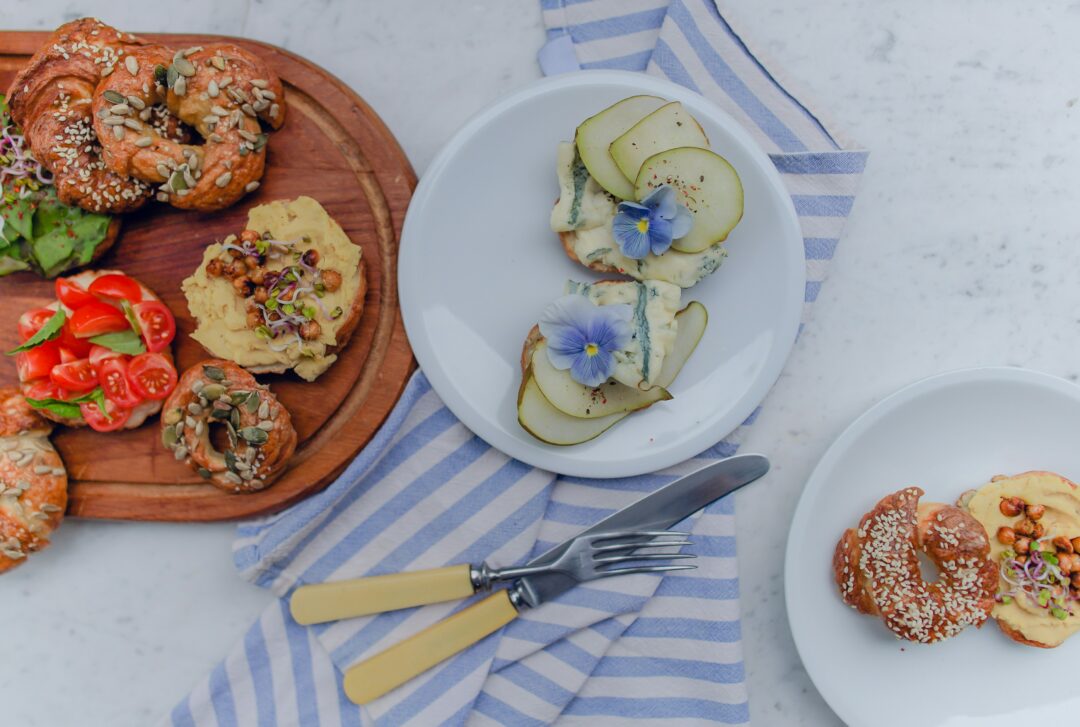
Vegan Food In Croatia
Although meat and seafood play a significant role in traditional Croatian cuisine, finding some delicious plant-based options and vegan versions of local dishes is still possible. Many supermarkets in Croatia, especially in larger cities and tourist destinations, stock a range of vegan products.
Fresh produce markets in Croatia often feature an abundance of fruits and vegetables.
Croatia enjoys a Mediterranean climate in many regions, which is conducive to cultivating various fruits.
Some popular fruits in Croatia include:
Apricots (Kajsije)
Apricots are used for making jams, pastries, and desserts, and they are harvested in the summer.
Grapes (Grožđe)
Grapes are essential for wine production in Croatia. The country has a long history of winemaking, and you can find various grape varieties grown throughout the country.
Olive (Maslina)
Olive trees are abundant along the Croatian coastline, particularly in regions like Istria and Dalmatia. Croatian olive oil is highly regarded for its quality.
Cherries (Trešnje)
Cherries are popular during the late spring and early summer months. They are used in various desserts, jams, and liqueurs.
Apples (Jabuke)
Apples are widely cultivated in the continental parts of Croatia and are commonly used for making apple-based products such as apple strudel.
Plums (Šljive)
Plums are used for making traditional Croatian plum brandy called “šljivovica” or “rakija.”
Citrus Fruits
In coastal areas with milder winters, citrus fruits like oranges and lemons are grown and enjoyed, especially during the winter months.
In urban areas, you can also enjoy international cuisines that offer vegan options. Italian, Middle Eastern, and Asian restaurants often have vegan-friendly dishes.
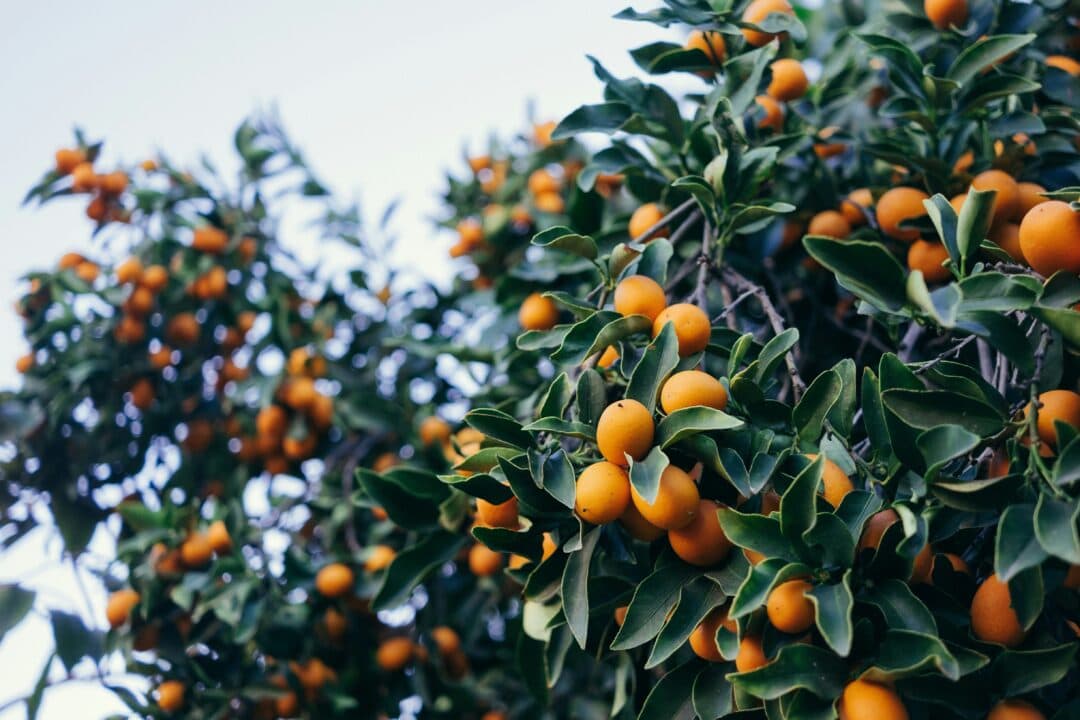
Vegan Dishes You Must Try In Croatia
Truffles
Istria is renowned for its truffles, and you can enjoy them in vegan pasta dishes, usually made with olive oil, garlic, and fresh truffles.
Fritule
Croatian doughnut-like pastries, often made vegan and dusted with powdered sugar.
Ajvar
A flavorful red pepper and eggplant spread is often served as a side dish or condiment.
Soparnik
A traditional Croatian pie filled with Swiss chard and garlic, vegan when made without dairy.
Peka
A slow-cooked dish with vegetables like potatoes, bell peppers, and eggplant, often cooked in olive oil and herbs.
Grilled Vegetables
Enjoy a medley of grilled vegetables seasoned with olive oil and herbs, a common side dish in Croatian cuisine.
Ćevapi
Try vegan ćevapi, small grilled sausages typically made from plant-based ingredients like seitan or soy.
Orahnjača & Makovnjača
These walnut and poppy seed rolls are a sweet treat often made vegan without eggs or dairy.
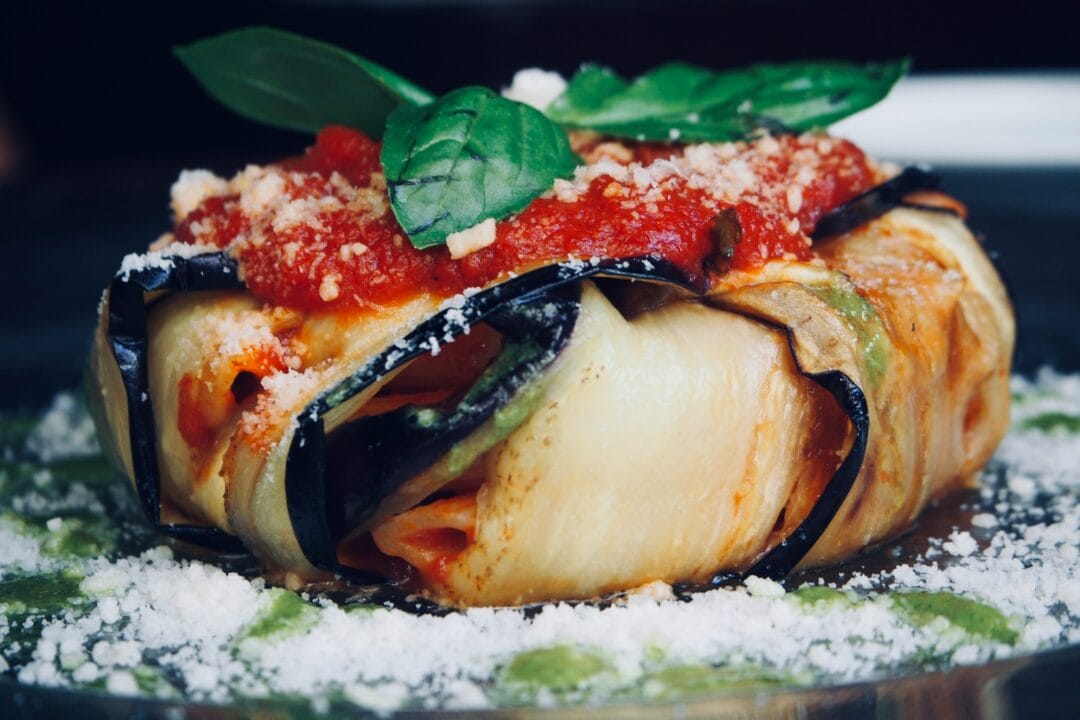
Non Vegan Ingredients In Croatian Cuisine
Vegans or those with dietary restrictions must know these non-vegan ingredients when dining in Croatia or preparing Croatian recipes at home. Communicating your dietary preferences and asking for vegan options or substitutions can help ensure a vegan-friendly meal. Additionally, reading food labels and inquiring about ingredients when shopping for packaged foods can help you make informed choices in Croatia.
Here are some commonly used non-vegan ingredients in Croatian cooking:
Meat
Meat, especially pork, is a significant component of Croatian cuisine. It is used in various dishes, including stews, roasts, sausages, and grilled meats.
Dairy Products
Dairy plays a prominent role in Croatian cooking, and many dishes contain dairy ingredients. Some common dairy-based products include cheese, yoghurt, sour cream, and butter.
Seafood
Along the Adriatic coast, seafood is a diet staple, and fish and other seafood are commonly used in various dishes.
Eggs
Eggs are used in various Croatian recipes including desserts.
Cheese
Cheese is a common ingredient in Croatian cuisine, and it is used in dishes like pasta, risotto, and pizza.
Milk
Milk is used in many traditional Croatian recipes, both in sweet and savoury dishes.
Honey
Honey is often used as a sweetener in Croatian desserts and pastries.
Butter
Butter is used for frying, sautéing, and as a spread for bread and pastries.
Cream
Cream is used to create sauces and soups and enriches desserts and coffee.
Ghee
Clarified butter, known as maslac od kiselog vrhnja, is sometimes used in cooking and baking.
Gelatin
Gelatin derived from animal collagen may be used in some desserts and confections.
Animal Fat
Animal fat, such as lard, may be used in traditional Croatian dishes for frying or flavouring.
Bone Broth
Traditional soups and stews may be prepared with bone-based broths for added flavour.
Meat-Based Stocks
Meat-based stocks or broths are used as a base for many traditional Croatian soups and stews.
Dining Out In Croatia
Eating out as a vegan in Croatia can be challenging as the vegan diet is often confused with a vegetarian diet. If you travel around Zagreb, it will be easier to find vegan restaurants. Smaller, local towns serve mostly traditional cuisine and communicating your dietary needs could prove difficult.
Breakfast
Traditional Croatian breakfasts are simple and hearty, emphasising bread, dairy products, and coffee. In recent years, there has been an increasing interest in healthier and more diverse breakfast options, and you can find cafes and restaurants in urban areas offering a more comprehensive range of breakfast choices, including smoothie bowls, avocado toast, and other international breakfast trends.
Many Croatians start their day with a slice of fresh bread, often with jam spread on top. Check out the local bakery or supermarket for vegan-friendly pastries such as vegan croissants, fruit tarts, and poppy seed rolls. Farmers’ markets also sell seasonal fresh fruit and homemade bread.
Croatians are known for their love of coffee, and a cup of strong, black coffee is an essential part of many people’s morning routine. You can find various styles of coffee, including espresso and Turkish coffee. Turkish coffee, or drip coffee, is typically vegan, consisting of coffee beans and water only. Be sure to specify that you want your coffee without milk or cream.
Lunch & Dinner
Meals vary significantly by region, so you will find various traditional lunch and dinner dishes as you travel around Croatia. Local produce is heavily favoured, so most meals contain fresh vegetables, seafood or meat. In addition, risotto, pasta, and homemade rustic bread are widely enjoyed and easily adapted for the vegan diet. Fresh salads with cucumber, tomatoes, and onions dressed in olive oil and herbs are often served for lunch or dinner.
Dessert
Many traditional sweets such as sponge cake, crepes, crème caramel or flan contain dairy products and eggs, so you must search for vegan-friendly establishments offering plant-based alternatives. Find a local shop selling vegan ice cream or fruit sorbet. Check out the local health food stores for vegan bliss balls, cookies, slices, chia puddings and smoothies.
Wine
Croatia has a rich and diverse wine culture with over two thousand years of history. The country’s unique geographical features, including its varied climates, terrains, and numerous indigenous grape varieties, contribute to the vibrancy of its wine production. Croatian wines come in various styles, including red, white, rosé, sparkling, and dessert wines. Some of the most renowned Croatian wines include Dingač and Postup (both made from Plavac Mali) in Dalmatia, Malvazija Istarska in Istria, and Graševina in continental Croatia. When purchasing wine, check if it is labelled and certified vegan to ensure no animal products are used in the production line.
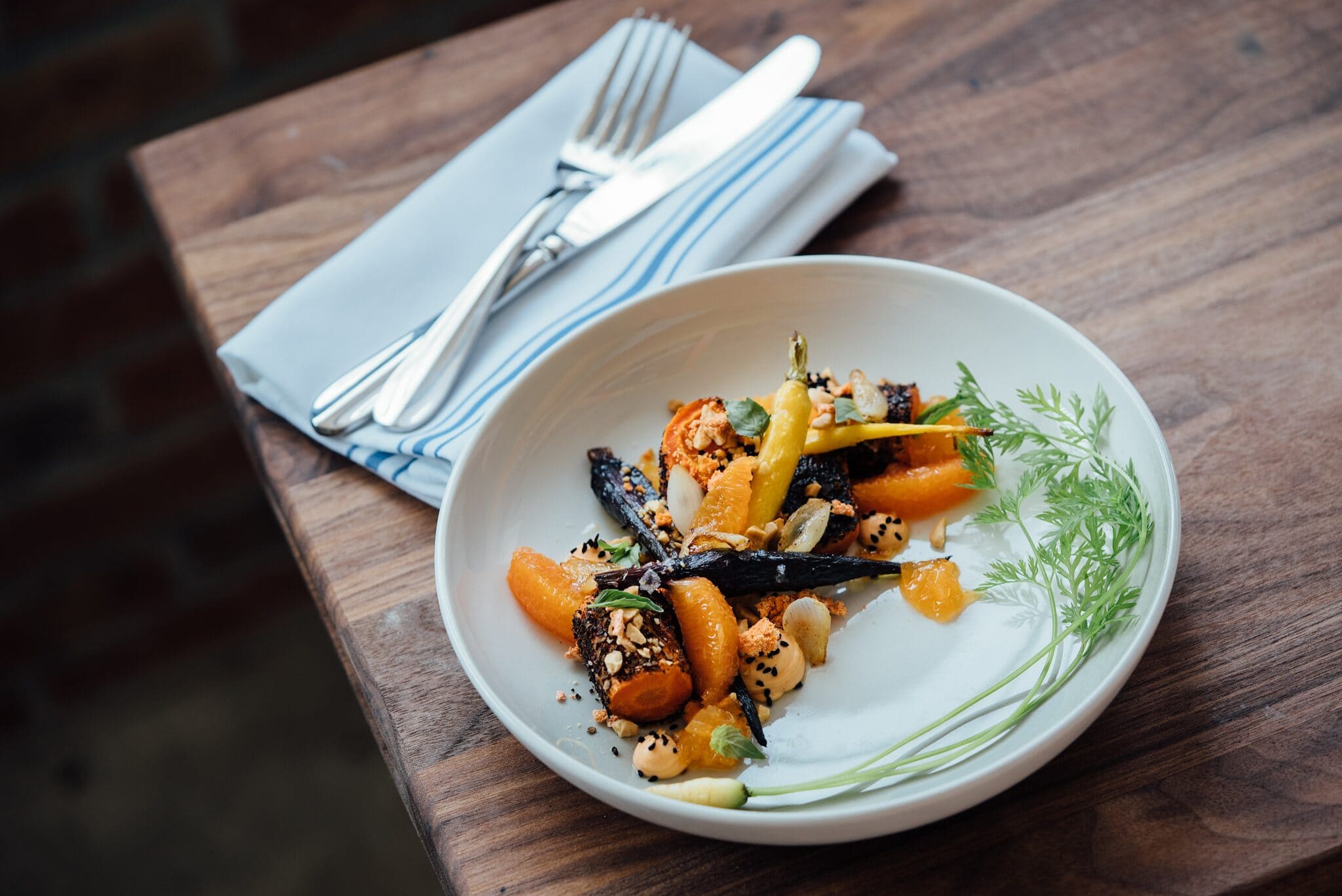
Vegan Restaurants In Croatia
Vegehop – Zagreb
A club/restaurant offering vegan burgers, sandwiches, wraps, and vegan wine and beer at the bar. Gluten-free dishes are available.
Barcode Mitra – Zagreb
An all-vegan restaurant serving various plant-based dishes, salads, smoothies and burgers using local organic ingredients.
BEKIND – Zagreb
A fully vegan burger restaurant serving American classics like Mac n Cheese, burgers and fries.
Salate & Co – Zagreb
Now fully vegan, Salute & Co serves pre-packaged salads and chia puddings.
Zrno Bio Bistro – Split
A vegan-friendly bistro serving dishes with locally sourced organic ingredients from Croatia’s oldest organic farm. It is an excellent spot for coffee on the outdoor terrace.
Pandora Greenbox – Split
An upmarket vegan restaurant perfect for healthy dishes made with raw, organic produce. A range of herbal teas, smoothies, juices, and cocktails are available at the bar, with an extensive menu of Mediterranean dishes.
Veg – Split
A vegan cafe offering simple classics such as burgers, burritos, breakfast plates and a selection of raw vegan cakes and coffee.
Nishta – Dubrovnik
A small vegan restaurant offering a range of salads, wraps and fresh juice. Gluten-free and raw options are available.
Urban & Veggie – Dubrovnik
A vegan hot spot in the city with a seasonal menu and plenty of healthy options, including soups, salads and raw vegan desserts. Be sure to book ahead, as reservations are required.
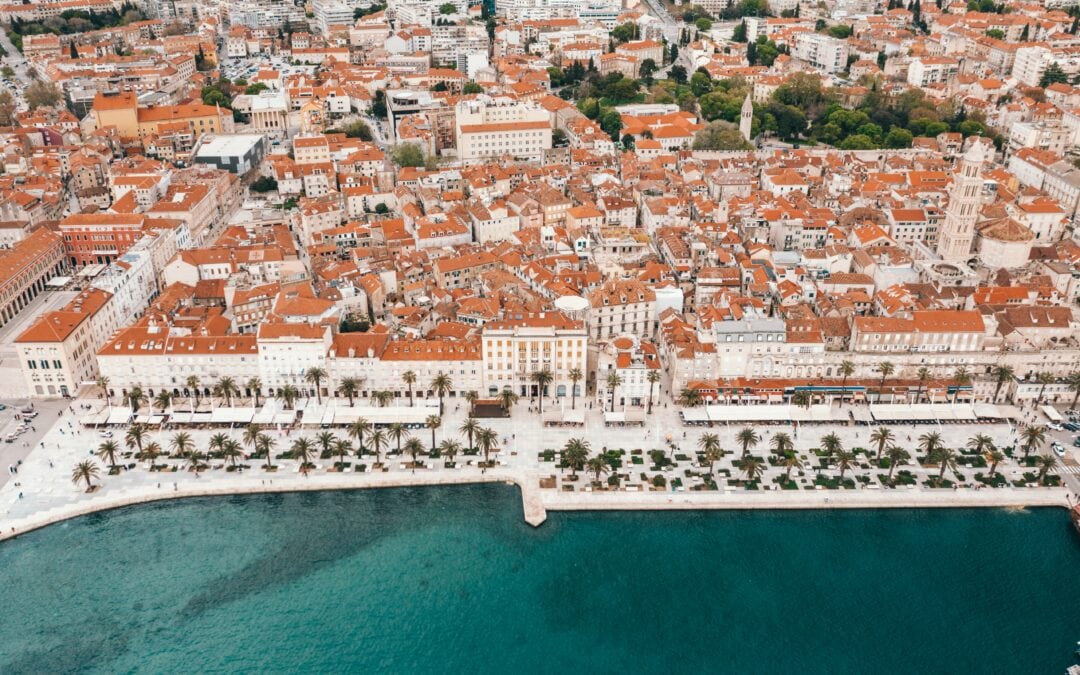
Best Time To Travel Croatia
Croatia has a mild Mediterranean climate along the coast and offers plenty of options year round for visitors. However, if you are looking for warmer weather it would be best to travel between April – May and September – October. The Getaway Co. hosts a trip in May because it is just before the peak tourist season at the end of Spring making it the ideal time of year to explore.
A Croatian Plantasy is now fully SOLD OUT! Taking place from May 18 – 25, 2024 alongside vegan lifestyle expert Richard Makin of School Night Vegan.
If you are interested in joining us on our next getaway to Croatia be sure to get in touch so we can add your name to our waitlist so you will be the first to know!
